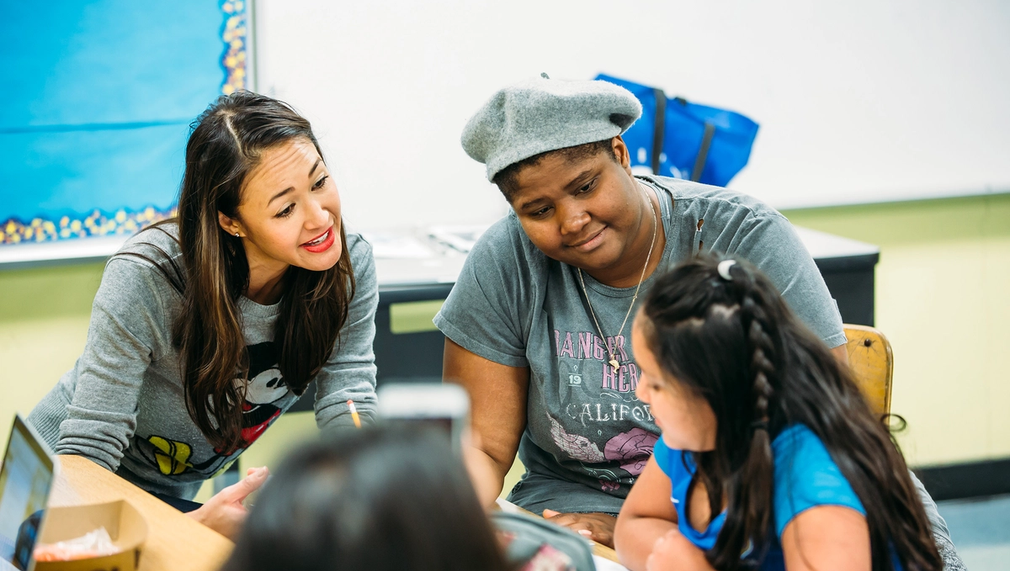Unlocking the Power of Story
At Young Storytellers, we raise voices, one story at a time. We want to take what we’ve learned over the past 25 years and offer our curriculum and educational toolkits to other communities across Los Angeles. We plan to expand into communities that have the highest need for our programming and provide toolkits, training resources, and more as we form partnerships to raise the voices of storytellers across the city.

What is the primary issue area that your application will impact?
K-12 STEAM Education
In which areas of Los Angeles will you be directly working?
City of Los Angeles
LAUSD (select only if you have a district-wide partnership or project)
In what stage of innovation is this project, program, or initiative?
Expand existing project, program, or initiative
What is your understanding of the issue that you are seeking to address?
To ensure that students are fully prepared to meet the demands of the 21st Century, the academic knowledge that schools impart must be matched by a commitment to developing social and emotional skills and competencies. Through a creative storytelling program that engages youth at the elementary, middle, and high school levels, our organization offers a Common Core-aligned, scaling curriculum to address targeted needs in public education. Our programs develop creative learning behaviors through the art of storytelling. Using group exercises and volunteer mentors, we provide young people, often those with historically marginalized identities, an opportunity to write stories and see them brought to life. It's important for our students to be mentored by other members of their community - who share common identities and lived experience - sending the implicit and explicit message that their stories can be powerful tools for change within their own communities.
Describe the project, program, or initiative this grant will support to address the issue.
Young Storytellers sparks creative self-discovery through storytelling. Our programs highlight young people as the center of their own narratives, emphasize that their stories matter, and celebrate their unique voices as the ones telling them. Young Storytellers works towards a future where young people experience the impact that their thoughts, feelings, and words can have on the world in which they live. We help young people tell their stories and see them performed in their communities. In elementary school, we use storytelling to help young people explore their creativity and imagination. In middle school, we use storytelling to explore their goals for the future and what challenges might stand in their way. In high school, we use storytelling to explore the impact a young person’s voice can have in their community - and more broadly, the world. Our programming is designed to act as a tool for educators to more deeply engage students who might be struggling or could use the extra attention a mentor provides. We use the arts—specifically storytelling and live performance—as a way for young people to develop themselves. As we center DEIB and anti-racism in our work, it is clear that we want to use the knowledge we've acquired over the past 25 years to equip existing community organizations, who serve young people with the greatest needs, with the tools they need to inspire them to discover the power of their voice through storytelling.
Describe how Los Angeles County will be different if your work is successful.
We believe in the power of storytelling; how stories impact young people and the people around them, and how they have a part in creating a more just and equitable world. Even in a rapidly changing world, stories can be used to speak truth, mobilize people, and shift power. Our goal is that more students will understand the impact and power that their words hold. As we plan to expand in LA, we are also reflecting on our organizational history. While our alignment with entertainment industry professionals has helped contribute to our success, it has also created challenges. Due to the demographics of this industry, our volunteers are not as representative of our students as we would like. Additionally, our partner schools tend to be in well-resourced neighborhoods adjacent to this industry and our volunteers. By creating toolkits, we hope to expand into communities where our programming is needed the most and ensure that students are led by mentors from their respective communities.
What evidence do you have that this project, program, or initiative is or will be successful, and how will you define and measure success?
In a Fall 2020 survey, 96% of 220 elementary school writers that participated in our Collaborative Stories program reported that they enjoyed their program experience, while 94% reported feeling comfortable working with their assigned mentor. 84% of writers reported that they felt more confident in their ability to learn new things after completing the program. 81% reported feeling more confident in sharing creative ideas with others and expressed a desire to write more stories in the future. A young writer affirmed the importance of sharing ideas with others and wrote that their “favorite thing about Young Storytellers was how welcoming my group was to new ideas when creating our story.” 83% of writers agreed that after completing the program, they are able to work and play with others despite disagreement or difference. This sentiment is echoed by a writer who reported that “[they] loved to work with others and share/hear different people’s perspectives…”
Approximately how many people will be impacted by this project, program, or initiative?
Direct Impact: 100
Indirect Impact: 100